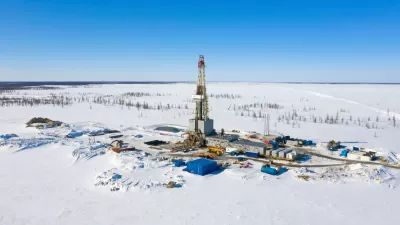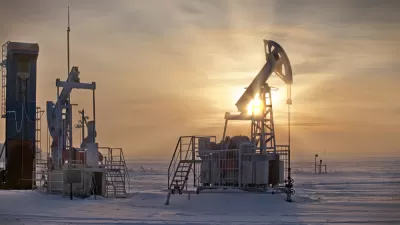Coal burning is rising everywhere save the U.S. If no changes are made to promote alternatives, it will overtake oil as the world's top energy source within a decade according to a new report from the Paris-based International Energy Agency (IEA).
The forecast of 2.6% annual coal consumption increase for the next six years included in the "Medium-Term Coal Market Report" is important because coal emits more carbon dioxide, criteria pollutants, and toxic emissions than either natural gas or oil, so impacts on climate change and public health are severe. Even in Europe, which has a cap & trade system and where many countries are signatories of the Kyoto climate treaty, coal use is expected to continue rising until 2017.
Marek Strzelecki writes that "(c)oal consumption will climb to 4.32 billion tons of oil equivalent by 2017, compared with about 4.4 billion for oil (see chart). Demand for coal rose 4.3 percent last year, with China accounting for 67 percent of the increase" and is expected "to replace Japan as the largest importer of the fuel", according to the report written by the International Energy Agency.
"Thanks to abundant supplies and insatiable demand for power from emerging markets, coal met nearly half of the rise in global energy demand during the first decade of the 21st Century,” IEA Executive Director Maria van der Hoeven said. “Coal’s share of the global energy mix continues to grow each year, and if no changes are made to current policies, coal will catch oil within a decade.”
Energy & Environment Publishing's Manuel Quinones writes about the important roles played by natural gas, carbon pricing, and carbon capture and storage (CC&S).
"Without charging high prices for burning coal, the IEA's van der Hoeven suggested gas as an antidote for reducing global CO2 emissions.
"The U.S. experience suggests that a more efficient gas market, marked by flexible pricing and fueled by indigenous unconventional resources that are produced sustainably, can reduce coal use, CO2 emissions and consumers' electricity bills, without harming energy security," said van der Hoeven. "Europe, China and other regions should take note."
"CCS technologies are not taking off as once expected, which means CO2 emissions will keep growing substantially", she said.
She added, "Without progress in CCS, and if other countries cannot replicate the U.S. experience and reduce coal demand, coal faces the risk of a potential climate policy backlash."
See IEA's "Medium-Term Coal Market Report 2012 Factsheet" to see who the world's largest coal exporters, importers, and coal projections for major regions of the world.
FULL STORY: Coal to Approach Oil as Top Energy Source by 2017, IEA Says

Alabama: Trump Terminates Settlements for Black Communities Harmed By Raw Sewage
Trump deemed the landmark civil rights agreement “illegal DEI and environmental justice policy.”

Study: Maui’s Plan to Convert Vacation Rentals to Long-Term Housing Could Cause Nearly $1 Billion Economic Loss
The plan would reduce visitor accommodation by 25% resulting in 1,900 jobs lost.

Planetizen Federal Action Tracker
A weekly monitor of how Trump’s orders and actions are impacting planners and planning in America.

Wind Energy on the Rise Despite Federal Policy Reversal
The Trump administration is revoking federal support for renewable energy, but demand for new projects continues unabated.

Passengers Flock to Caltrain After Electrification
The new electric trains are running faster and more reliably, leading to strong ridership growth on the Bay Area rail system.

Texas Churches Rally Behind ‘Yes in God’s Back Yard’ Legislation
Religious leaders want the state to reduce zoning regulations to streamline leasing church-owned land to housing developers.
Urban Design for Planners 1: Software Tools
This six-course series explores essential urban design concepts using open source software and equips planners with the tools they need to participate fully in the urban design process.
Planning for Universal Design
Learn the tools for implementing Universal Design in planning regulations.
Caltrans
Smith Gee Studio
Institute for Housing and Urban Development Studies (IHS)
City of Grandview
Harvard GSD Executive Education
Toledo-Lucas County Plan Commissions
Salt Lake City
NYU Wagner Graduate School of Public Service




























